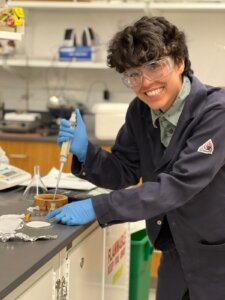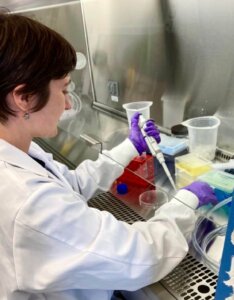Natives of the Seacoast region, Ellen Blackwell and Luciana Custer began their educational journeys at GBCC.
 PORTSMOUTH – Two Great Bay Community College (GBCC) alumni are breaking barriers in the field of bioengineering. GBCC offers a bioengineering degree, part of a life sciences program that also includes degree offerings in biotechnology and biological science. These programs serve as a foundation to drug development, regenerative medicine and clinical trials and testing.
PORTSMOUTH – Two Great Bay Community College (GBCC) alumni are breaking barriers in the field of bioengineering. GBCC offers a bioengineering degree, part of a life sciences program that also includes degree offerings in biotechnology and biological science. These programs serve as a foundation to drug development, regenerative medicine and clinical trials and testing.
Natives of the Seacoast region, Ellen Blackwell and Luciana Custer began their educational journeys at GBCC. While affordability, convenience and small class sizes drew them to the college, their experiences at GBCC put them on pathways at the cutting edge of the bioengineering field.
Both Ellen and Luciana parlayed their community college education into fellowship and scholarship opportunities as they pursued their education after graduating from GBCC. Life science students at the college have the opportunity to engage in research on campus or in labs at four-year partner institutions. This work is supported by grants from the National Science Foundation’s EPSCoR program to the UNH-led New Hampshire Center for Multiscale Modeling and Manufacturing of Biomaterials (NH BioMade) and the National Institute of Health’s New Hampshire IDeA Network of Biological Research Excellence (NH-INBRE).
While Luciana (they/them) knew they wanted to do research from the beginning, the start of the journey was a bit different for Ellen.
“I had never considered Bioengineering, but it encompassed all of the different sciences that I enjoyed, and the college was commutable and really affordable,” said Ellen who lives in Exeter. “When I started, all of my GBCC professors were supportive and helpful in making sure I knew about different research and scholarship opportunities.”
 After graduating from GBCC in 2021 with her associate degree in Bioengineering, Ellen seamlessly transferred to UNH’s Bioengineering program, earning a NH BioMade Transfer Scholarship. In her second and final year at UNH, Ellen has been working in the Chemical Engineering department characterizing polymer solutions for the enhancement of cellular function in biomaterials.
After graduating from GBCC in 2021 with her associate degree in Bioengineering, Ellen seamlessly transferred to UNH’s Bioengineering program, earning a NH BioMade Transfer Scholarship. In her second and final year at UNH, Ellen has been working in the Chemical Engineering department characterizing polymer solutions for the enhancement of cellular function in biomaterials.
This summer she began a six-month co-op for high-throughput and scale-up lab experiments at Bristol Myers Squibb in Devens, Massachusetts, utilizing automated robotic platforms, and monitoring bioreactors with skills first learned in her Biomanufacturing course in the GBCC lab. Ellen is considering an accelerated master’s program after graduation and would like to focus her career in biopharmaceuticals.
Like Ellen, Luciana’s start at GBCC helped pave the way to exciting opportunities.
“I needed a smaller environment to develop confidence in myself and in my academic skills,” said Luciana, who is now living in Los Angeles, California. “Great Bay was really important for me at that time in my life when I was struggling with mental health. GBCC was a place for me to regroup.”
Luciana’s personal struggles solidified a desire to help others. They began by taking small steps, ultimately earning associate degrees in Biotechnology and Bioengineering from GBCC before transferring to the UNH and graduating with a bachelor’s degree in Bioengineering. While at UNH, Luciana worked in the Surface Enhanced Electrochemical Diagnostic Sensors Lab to create novel electrochemical biosensors for disease diagnosis.
Luciana is currently in the first year of a PhD program at the University of Southern California (USC) and has been awarded several fellowships in support of continuing their education, most recently an NSF Graduate Research Fellowship, an extremely competitive five-year fellowship that includes three years of financial support totaling $138,000. As a member of the Armani Research Lab at USC, Luciana is testing a novel dye molecule that modulates and reports electrical fields. Their initial work will involve developing a microscope-integrated instrument to optically activate the dye, working with live cells to characterize their bioelectrical activity with high spatiotemporal resolution. The instrument may soon be used by collaborators at the Ellison Institute to study the role of electrical signaling in the migration of glioblastoma, a very aggressive brain cancer.
The pathway is more than just a career for Luciana; it is a big change in their life and upbringing. Coming from extremely modest circumstances, Luciana is now working at the cutting edge of emerging science that promises to be life-changing for countless numbers of people who will benefit from the groundbreaking work.
In fact, helping others is a common theme for Luciana.
“I really love mentoring and it’s fun to interact with new scientists and introduce them to the field,” Luciana said. “I am always trying to help community college students because it is really of important to me to give back to them.”
Luciana is on track to earn a PhD in 2026 in Biomedical Engineering and is considering as a next step working with pharmaceutical companies that specialize in neuropsychiatric work or with labs associated with the National Institute for Mental Health.
Both Ellen and Luciana credit their success to their start at GBCC, which not only put them on this educational pathway but also opened doors to scholarships, fellowships, and seamless transfer to UNH to continue their education. The two dedicated scientists are poised to contribute greatly to the industry. Whether it is growing artificial tissues, industrial biomanufacturing, developing sensors, or testing dyes for neuroelectric imaging, Bioengineering offers a meaningful career in work that can improve lives now and in the future.

